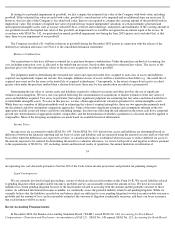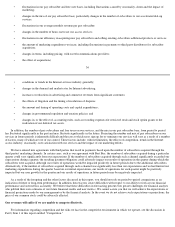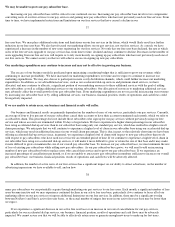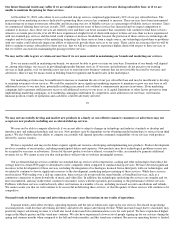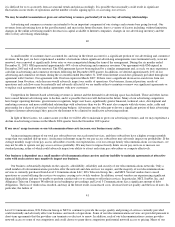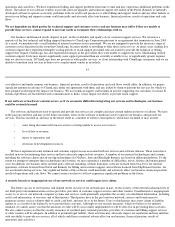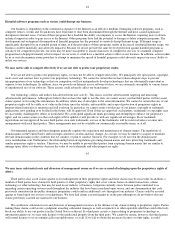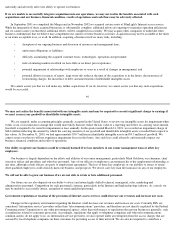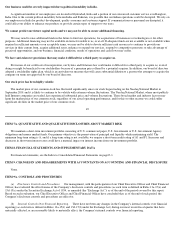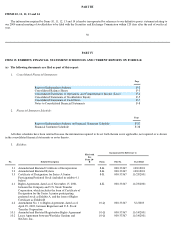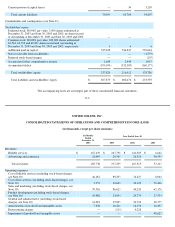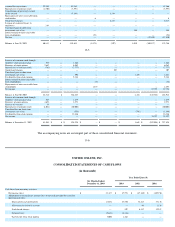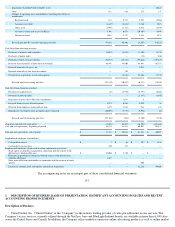Classmates.com 2003 Annual Report Download - page 37
Download and view the complete annual report
Please find page 37 of the 2003 Classmates.com annual report below. You can navigate through the pages in the report by either clicking on the pages listed below, or by using the keyword search tool below to find specific information within the annual report.
percentage of our gross revenue to support "universal service" subsidies for local telephone services and other public policy objectives, such as
enhanced communications systems for schools, libraries and some health care providers. The FCC, however, has initiated several proceedings
in which it is examining the regulatory status of ISPs and is currently reconsidering what types of entities should contribute to the federal
universal service funds. In addition, we operate our services throughout the United States, and regulatory authorities at the state level may seek
to regulate aspects of our activities as telecommunications services. As a result, we could become subject to FCC and state regulation as
Internet access services and telecommunications services converge. If the regulatory status of ISPs changes or if access, universal service, or
other charges are imposed on ISPs or on dial-up consumers to access the Internet, our business may be adversely affected.
47
In addition, the tax treatment of activities on or relating to the Internet is currently unsettled. A number of proposals have been made at the
federal, state and local levels and by foreign governments that could impose taxes on the online sale of goods and services and other Internet
activities. The Internet Tax Freedom Act, which placed a moratorium on new state and local taxes on Internet commerce expired in
November 2003. This moratorium may not be reinstituted, and future laws imposing taxes or other regulations on the provision of goods and
services over the Internet could make it substantially more expensive to operate our business.
Changes in, or interpretations of, laws regarding consumer protection could subject us to liability or cause us to change our practices.
Consumer protection laws and enforcement actions regarding advertising and user privacy, especially relating to children, are becoming
more prevalent. The FTC has conducted investigations into the privacy practices of companies that collect information about individuals on the
Internet. The FTC has also investigated us and other ISPs in connection with marketing, billing and disclosure practices. Juno and the FTC
entered into a consent agreement, which was approved by the FTC on June 29, 2001, that provides for redress payments and specific
disclosures or notices regarding, among other things, the cost of its Internet access services, its cancellation terms and local versus long-
distance charges, as well as the requirement to provide adequate customer support to process cancellations.
Various state agencies as well as individuals have also asserted claims against, or instituted inquiries into, ISPs, including Juno and
NetZero, in connection with marketing, billing and disclosure practices. We cannot assure you that our services and business practices, or
changes to our services and business practices, will not subject us to claims and liability by private parties, the FTC or other governmental
agencies.
It is possible that additional laws and regulations may be adopted that could affect our business covering issues such as bulk email or
"spam," access to various types of content by minors, encryption and consumer protection. We cannot predict the impact that future regulatory
changes or developments may have on our business, financial condition, results of operations or cash flows. The enactment of any additional
laws or regulations in this area, increased enforcement activity of existing laws and regulations, or claims by individuals could significantly
impact our costs or the manner in which we conduct business, all of which could adversely impact our results of operations and cause our
business to suffer.
We could be exposed to liability for defamation, negligence and infringement.
Because users download and redistribute materials that are cached or replicated by us in connection with our Internet services, claims
could be made against us for defamation, negligence, copyright or trademark infringement, or other theories based on the nature and content of
such materials. While we have attempted to obtain safe harbor protection against claims of copyright infringement under the Digital
Millennium Copyright Act of 1998, we cannot assure you that we will prevail in any such claims. We also could be exposed to liability because
of third-
party content that may be accessible through our services, including links to Web sites maintained by our users or other third parties, or
posted directly to our Web site and subsequently retrieved by a third party through our services.
Our business could be shut down or severely impacted by a catastrophic event.
Our computer equipment and the telecommunications infrastructure of our third-party network providers are vulnerable to damage from
fire, earthquakes, power loss, telecommunications failures, terrorism and similar events. We have experienced situations where power loss and
telecommunications failures have adversely impacted our services, although to date such failures have not been material to
48
our operations. A significant portion of our computer equipment, including critical equipment dedicated to our Internet access services, is
located at our headquarters in Westlake Village, California and at facilities in Los Angeles, California; Sunnyvale, California; and New York,
New York. In the past, areas in California have experienced repeated episodes of diminished electrical power supply, or "rolling blackouts." A
natural disaster, terrorism, power blackout or other unanticipated problem at our headquarters or at a network hub, or within a third-party
network provider's network, could cause interruptions in the services that we provide. Our systems are not fully redundant. Any prolonged
disruption of our services due to system failures could result in user turnover and decreased revenues.


